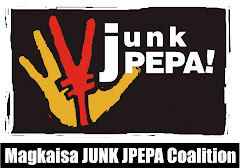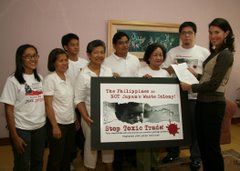31 July 2008, Quezon City. – A people’s coalition campaigning against the ratification of the controversial Japan-Philippines Economic Partnership Agreement (JPEPA) applauded the collapse of the Doha round of multilateral trade talks in the World Trade Organization (WTO) in Geneva.
“A WTO deal would have exposed the developing countries like the Philippines further to the exigencies of the global market and would have deprived the country of safeguard mechanisms against import surges,” Atty. Golda Benjamin, lead counsel of the Magkaisa Junk JPEPA (MJJC), said.
"Under a liberalized trade regime, import-dependent countries like the Philippines face the very real threat of being flooded with highly-subsidized and cheap products from abroad,” she warned.
"With the JPEPA, the Philippines is practically opening up its entire agricultural market with the sole exception of rice and salt to Japanese imports. What we need is some sort of shield from the threat of import surges,” Arze Glipo, lead convenor of the Task Force Food Sovereignty, a partner of the MJJC, said.
The Doha round of multilateral trade talks of the World Trade Organization(WTO) collapsed yesterday over huge disagreements on how to deal with agriculture subsidies and food tariffs. One of the more contentious issues is the proposed language on special safeguards mechanisms for developing countries or SSM.
The SSM is an instrument that would allow developing countries to increase tariffs to ward off the negative effects on the livelihoods of farmers from import surges. Developed countries led by the United States have over the course of the seven-year negotiations been trying to impose strict conditions on the use of SSM.
"The watered-down proposal on SSM in the WTO, that was rightfully rejected by developing countries, would exclude imports covered by bilateral trade agreements like JPEPA from the computation of import volumes, effectively depriving the Philippines and developing countries that have signed bilateral FTAs, the use of this remedial mechanism" explained Joseph Purugganan of the Focus on the Global South, another MJJC partner.
"We are glad that developing countries stood up to defend their right to effective safeguards under the WTO but our urgent call is to the Senate to reject JPEPA. It is a known fact that developed countries are using bilaterals to get what they failed to obtain at the WTO. The Senate must recognize this. It is not yet too late to put the interest of the Philippines at the heart of the JPEPA controversy. There is only one way to vote, no to JPEPA as the developing countries have said NO! to the WTO Doha round of talks," the MJJC stated.
Subscribe to:
Post Comments (Atom)






No comments:
Post a Comment